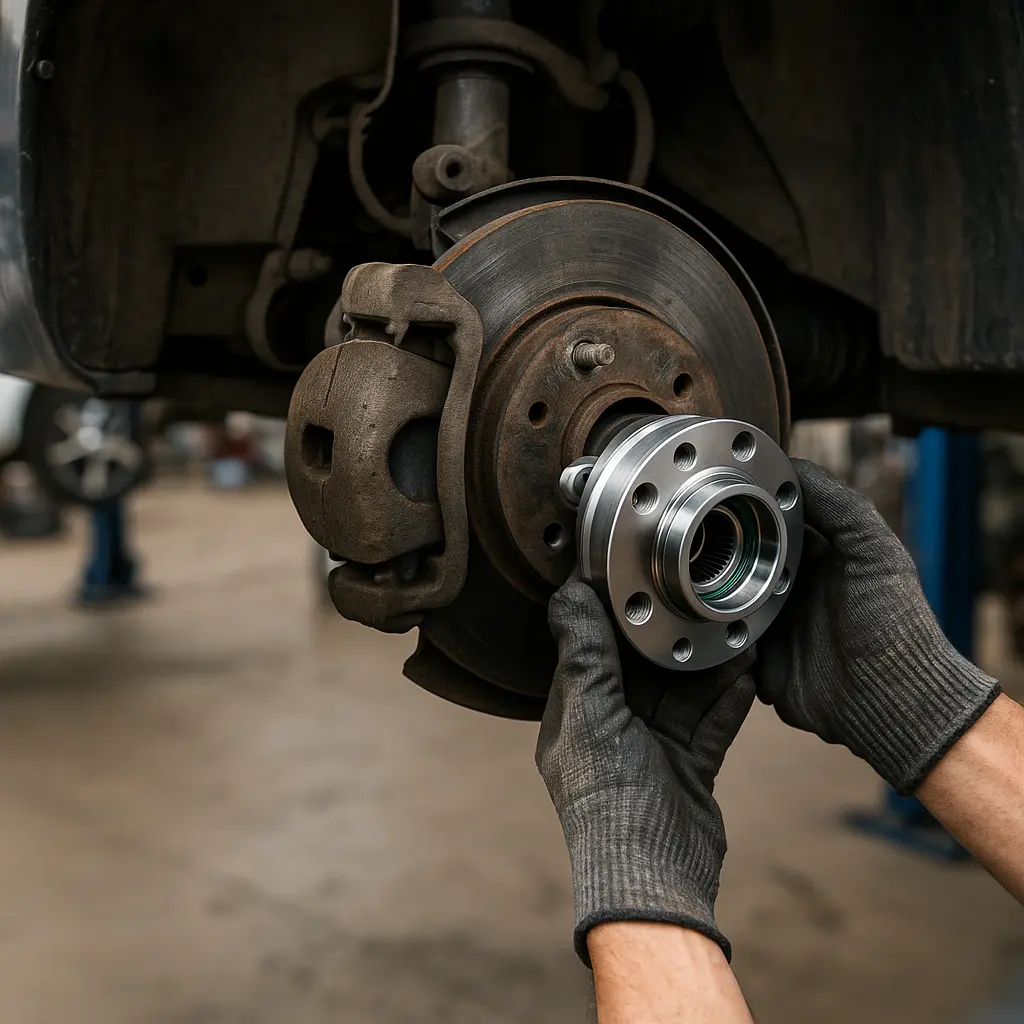How Much Does Wheel Bearing Replacement Cost in 2025?
Expect to pay between £180 and £400 for wheel bearing replacement in the UK, depending on vehicle make, model, bearing type, and local labour charges.
Wheel bearings are a vital component of your car’s wheel assembly, ensuring smooth rotation and handling. If you notice humming, grinding noises, or loose steering, it may be time to investigate the wheel bearing replacement cost. This detailed UK cost guide for 2025 covers everything you need to know — from average prices and what’s included, to cost-saving tips and detailed FAQs.
Average Wheel Bearing Replacement Cost UK
Wheel bearing replacement cost vary depending on whether you’re replacing the front or rear bearings, the make and model of your car, and where you have the work done. A typical front wheel bearing replacement cost is often cheaper due to easier access, while rear wheel bearing replacements can be more labour-intensive, especially for vehicles with integrated hub assemblies or rear drum brakes. Premium or performance vehicles can also incur higher charges due to specialised parts and labour.
In 2025, garages across the UK quote between £180 and £400 for a complete wheel bearing replacement. If you’re experiencing unusual noises from the wheels, don’t delay getting quotes, as continued driving on a failing bearing can damage other components.
| Service Type | Average Cost |
|---|---|
| Front Wheel Bearing Replacement | £180–£300 |
| Rear Wheel Bearing Replacement | £200–£350 |
| Luxury Vehicle Wheel Bearing | £300–£400 |
| 4×4 or SUV Wheel Bearing | £250–£380 |
Real UK Garage Prices — Correct as of 9th July 2025
| Location / Source | Average Price | Garage / Source |
|---|---|---|
| National average (Bumper.co.uk) | £170–£400 | Bumper |
| UK average (ClickMechanic) | £175 (range £120–£300) | ClickMechanic |
| UK average (FixMyCar) | £257.63 | FixMyCar |
| UK average (Fixter) | £210 (range £172–£350) | Fixter |
| Forum quote (Reddit) | £100–£150 (parts + ~1h labour) | Reddit r/CarTalkUK |
Wheel bearing costs vary depending on whether you replace front or rear bearings, parts quality, and where you live. Be sure to request quotes from local garages for the most accurate pricing.
What’s Included in a Wheel Bearing Replacement?
- Full diagnostic check to identify the faulty bearing and ensure no other components are affected
- Removal of the affected wheel, brake caliper, and disc or drum to access the hub assembly
- Extraction of the worn or damaged wheel bearing using press tools or replacement of the full hub unit
- Installation of a new bearing — either OEM (original equipment manufacturer) or high-quality aftermarket parts
- Proper torqueing of all nuts and bolts to manufacturer specifications
- Reinstallation of brake components and wheel with safety checks
- Test drive to verify smooth rotation and noise elimination
- Warranty documentation for both parts and labour, typically ranging from 12 to 36 months
How to Save Money on Wheel Bearing Replacement
- Compare local garage quotes: Use online quote comparison platforms or call at least three independent garages to identify the best price without compromising quality.
- Schedule during service: If your car is due for a service or MOT, consider bundling the repair. Combining jobs can reduce overall labour time and cost.
- Provide your own parts: Buying bearings from trusted automotive suppliers online can save up to 30%, though always confirm compatibility and garage policy beforehand.
- Use a trusted mobile mechanic: Many mobile technicians offer lower hourly rates and come directly to your home or office, saving on logistics and overhead costs.
- Check for goodwill repairs: Some dealerships offer goodwill fixes if your vehicle is just outside warranty and the issue is known to the manufacturer.
- Get a second opinion: Don’t accept the first diagnosis blindly. If you’re unsure whether the bearing really needs replacement, seek another inspection to avoid unnecessary expenses.
Frequently Asked Questions
What are the signs that a wheel bearing needs replacing?
The most common symptoms include a persistent humming, grinding, or growling noise coming from one of the wheels, particularly noticeable at higher speeds. You may also feel vibrations in the steering wheel or the entire car body. Uneven tyre wear, difficulty steering, and play in the wheel hub are also indicators. In extreme cases, your ABS warning light may appear due to sensor issues linked to the wheel bearing assembly. Early diagnosis and repair can prevent more costly suspension or brake system damage.
How long does it take to replace a wheel bearing?
On average, a straightforward wheel bearing replacement takes 1.5 to 3 hours per wheel. The exact time depends on the car make and model, whether it’s the front or rear bearing, and if it requires special tools. Some vehicles have press-fit bearings which need hydraulic presses and take longer, while others come with pre-assembled hub units that are faster to replace. Mechanics may also take time to clean and inspect adjacent components such as the hub spindle and brake system, ensuring safety and optimal performance post-installation.
Can I drive with a bad wheel bearing?
While it’s technically possible to drive short distances with a failing wheel bearing, it’s highly unsafe and strongly discouraged. A degraded bearing can suddenly seize or break apart, causing the wheel to lock or detach from the axle. This poses a serious accident risk. Furthermore, continuing to drive can lead to damage of the hub assembly, brake disc, ABS sensor, and even the driveshaft, significantly increasing the overall repair cost. It’s best to address wheel bearing issues promptly once symptoms appear.
Is it cheaper to replace front or rear wheel bearings?
In most vehicles, front wheel bearing replacement tends to be less expensive. This is largely because front bearings are often more accessible and don’t always require disassembly of complex brake or suspension systems. Rear wheel bearings may be integrated into the hub or drum assembly, making removal and installation more involved and time-consuming. For example, replacing a rear bearing on a car with drum brakes may take twice as long as the front. However, the exact cost difference varies by vehicle type and labour rate.
Do wheel bearings come with a warranty?
Yes, reputable replacement bearings come with manufacturer warranties ranging from 12 months to up to 3 years, depending on the brand and supplier. Labour warranties, however, are provided at the mechanic’s discretion — typically covering 3 to 12 months. When booking your replacement, ensure both parts and labour are backed by a written warranty for peace of mind. It’s also wise to retain your receipt and ask if any follow-up adjustments or torque checks are included as part of the service guarantee.
How often do wheel bearings need replacing?
Wheel bearings usually last between 85,000 and 100,000 miles under normal driving conditions. However, lifespan can vary based on factors such as road quality, driving style, climate exposure, and vehicle load. For instance, frequent driving on potholed roads, through floodwater, or with heavy towing can accelerate wear. Sealed bearings last longer but are not serviceable, so once worn, they must be replaced entirely. If you hear noises or feel vibrations during turning or acceleration, have your bearings inspected immediately.

Want to DIY? Watch:
Other Relevant Articles
How much does suspension repair cost in the UK?
A failing wheel bearing can cause symptoms similar to suspension problems, such as clunking noises or uneven tyre wear.
How much does wheel alignment cost in the UK?
After replacing a wheel bearing, a proper wheel alignment may be necessary to restore optimal steering and tyre balance
